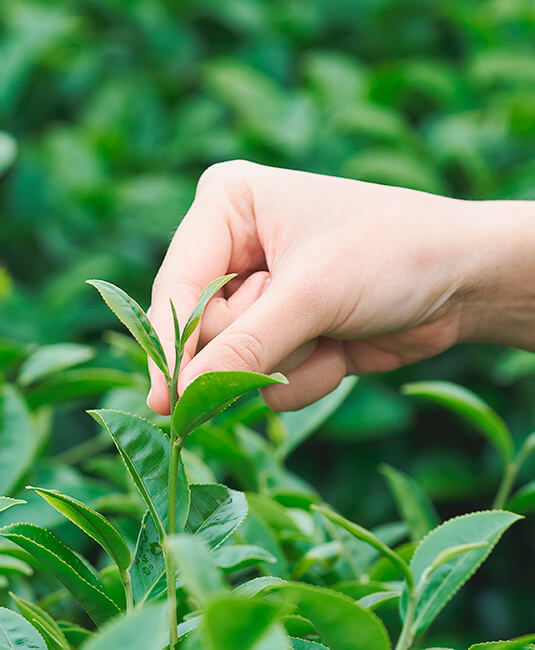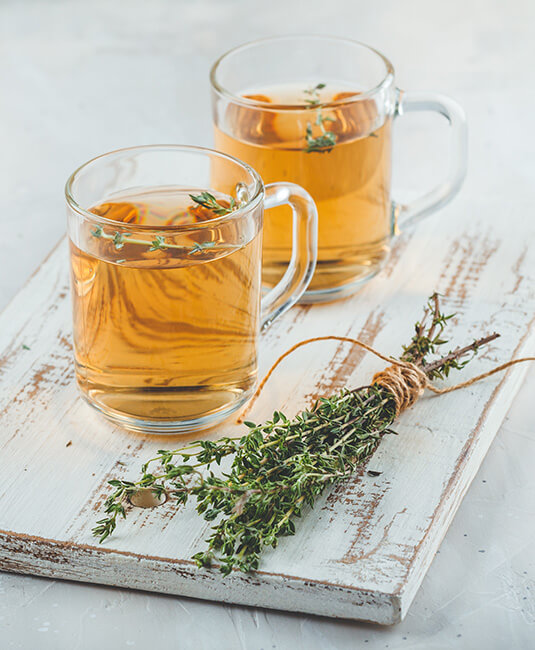Free shipping from $55

Can tea help improve sleep quality?
Tea may enhance sleep quality due to one of its primary components, L-theanine, which multiple studies have demonstrated to possess anti-stress and calming attributes. When administered to study participants, researchers observed that this amino acid facilitated the generation of alpha waves in the brain, indicating a state of relaxation and generating a soothing effect similar to what one might experience during meditation, a warm bath, or a massage. Furthermore, L-theanine elevates brain levels of GABA and serotonin, which are neurotransmitters associated with relaxation.
Therefore, while we cannot assert that L-theanine in tea has explicit sedative effects, this compound does play a role in fostering a sense of contentment and relaxation, thereby contributing to achieving restorative and higher-quality sleep, leading to a refreshed feeling upon waking.

Which herbal infusions are most recommended for sleep?
Several plants are among the classics of natural sleep remedies, to be consumed alone or in combinations, 30 minutes before bedtime:
- Chamomile: This flower contains an active substance called apigenin, which has calming and sedative effects.
- Orange blossom: Its active compounds (linalool, sesquiterpenes, etc.) possess tranquilizing and mild antidepressant effects that aid in falling asleep, particularly in cases of stress or excitement.
- Lime flower: The flowers of this plant contain farnesol, which, by binding to benzodiazepine receptors in the brain, provides a tranquilizing effect and promotes sleep onset.
- Verbena: Its leaves contain sedative molecules, including verbascoside. It is recommended, especially when nervousness disrupts sleep.
- Lemon balm: The active components in its leaves (triterpenes, flavonoids, etc.) have relaxing, calming, and sedative effects, facilitating a quicker onset of sleep.
Does black or green tea prevent you from sleeping?
Black and green teas contain theine, which is the same molecule as caffeine, a stimulating substance that can potentially delay falling asleep, reduce the total duration of sleep, and alter its structure, leading to more frequent awakenings.
However, the caffeine in tea (or theine) is not absorbed in the same way as caffeine from coffee. Other molecules (such as tannins and L-theanine) mitigate and delay its absorption in the intestinal tract. Released gradually, it acts in a more gradual and extended manner over time, without causing an overly stimulating effect. Furthermore, L-Theanine counterbalances these effects with its recognized relaxing properties.
Moreover, in general, teas, especially black teas, contain less caffeine than coffee. For 150 ml (1 small cup), a coffee provides about 60 mg (arabica) to 115 mg (robusta) of caffeine, while for the same volume of beverage, tea contains only 26 to 70 mg depending on the variety, with an average content close to 30-40 mg.
Finally, the rate of caffeine elimination varies among individuals. The enzymes responsible for metabolizing caffeine in the liver have a genetic component, leading to distinctions between slow and fast metabolizers. There is also a genetic sensitivity difference, related to individual variances in brain receptors to which caffeine binds.

Does tea make you sleep?
Thanks to certain relaxing compounds, such as L-Theanine, tea can promote relaxation. A British study from 2007 demonstrated that the consumption of 4 cups of tea per day leads to a significant reduction in cortisol levels, which is the stress hormone.
Scientific research has indicated that the positive effects of tea on sleep are more pronounced when the caffeine (theine) content is minimal. This is true for specific tea varieties with low caffeine levels and caffeine-free herbal infusions like rooibos. It is advisable to prefer these beverages in the later part of the day, particularly after 4-5 p.m., especially if you are particularly sensitive to caffeine. Additionally, it is possible to reduce the caffeine content in your tea, for instance, by discarding the first infusion water.
Does chamomile help you sleep?
When traditionally consumed, this flower houses an active compound known as apigenin, which possesses calming and sedative properties. The World Health Organization (WHO) acknowledges its use for alleviating nervous restlessness and mild insomnia. Numerous studies, particularly among elderly individuals or women experiencing postpartum depression, have demonstrated its advantageous impact on sleep.
